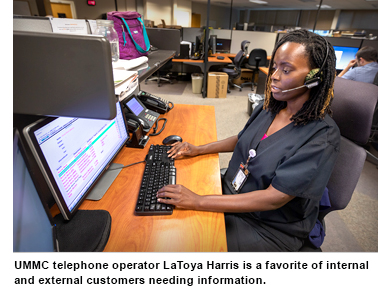For Service, Call the Operator
Good morning!
Recently I met with a group of early- to mid-career faculty who have been described as energetic, engaged and potential future leaders. They are among the up-and-comers who have established themselves in their careers and have the option of continuing to progress here for years to come or casting their lot elsewhere.
 This “demographic” is important (and this group was just a representative sample; there are many others). I want UMMC to be the place where all the young, fantastic faculty desire to work and I asked this group to give me insights into what we can do better as an organization to make that a reality.
This “demographic” is important (and this group was just a representative sample; there are many others). I want UMMC to be the place where all the young, fantastic faculty desire to work and I asked this group to give me insights into what we can do better as an organization to make that a reality.
But first, they were unanimous about what they love about UMMC. They love their work—taking care of patients, teaching and discovery. The work is meaningful and they know it makes a difference. Among the clinicians, they also feel that even as we have shifted away from the “resident-run” hospital of the old days, there’s still plenty of opportunity for gaining clinical experience and for career advancement.
There was also consensus about what they find frustrating that could be broadly classified as poor customer service – not toward our patients and their families or students, but toward them as internal customers of our support departments. Some call it a bad attitude; some say it’s the “bureaucracy” that seems to slow down or stymie any initiative; and I’ve heard others refer to it as the “state employee mentality,” which I don’t particularly care for because it does a disservice to many state employees here and elsewhere who provide dedicated and superior service.
But everybody knows what we are talking about when we say poor customer service. A few examples:
- Interacting with your personal phone while you are “helping” a customer
- Failing to greet people with a smile and an enthusiastic “May I help you?”
- Not answering the phone in a timely manner – or at all
- Giving a reflexive “no” to every new idea just because it doesn’t conform to “the way we’ve always done it”
And then there are the institutional processes that can just wear a body down, from navigating the regulations of the IRB or compliance, to hiring an employee, to procuring needed equipment, to deciphering a budget, to getting a contract through the system, to making sense of the bewildering array of software that has become ubiquitous and indispensable to running an academic medical center but can be just so blessed aggravating! Yes, we have made major strides in streamlining many of these activities, and that work by dedicated staff continues every day. But we are a long way from the mindset that these business functions exist to serve the faculty and staff in the mission areas and to make this part of their work easy so they can spend most of their time on the vital business of teaching, discovery and patient care.
To be fair, I’m sure there are times when our internal customers come across as rude, arrogant, pushy or otherwise unpleasant. I wish this weren’t so, and I appeal to them to behave better, but I do think these individuals are a small minority. And I’m a big believer that when you have customers, the old adage applies: The customer is always right. We are here to serve them. And that includes yours truly.
In the months ahead, we will be looking at some initiatives to improve training and bring a greater focus to service excellence, not just for patients and their families, but for internal customers as well. And I have asked our newly formed Office of Wellbeing to begin to map what issues rank as persistent “dissatisfiers” for our faculty and staff, in the hope of chipping away at these in a systematic manner.
Back to my meeting with that group of faculty members. Although they expressed some common themes about issues that grieve them, several of them specifically mentioned an experience that consistently brightened their day: Any time they had a conversation with one particular UMMC telephone operator, LaToya Harris. I’m paraphrasing here, but they said LaToya’s “consistently friendly, professional, customer service-based attitude conveys ‘How can I help you?’” And I’m told this is true whether she is talking with a member of the public calling for assistance or a member of our own team trying to track down an attending on-call for the fourth time in one day.
So thank you, LaToya, for serving as a role model for the rest of us. We need more people who – like you – treat our colleagues with respect, kindness and professionalism, on our journey toward A Healthier Mississippi.



